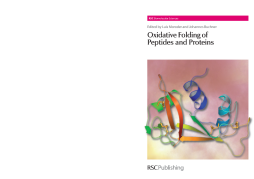
BOOK
Oxidative Folding of Peptides and Proteins
Grzegorz Bulaj | David Craik | Paul Alewood | John D Wade | Rudolf K Allemann | Dallas L Rabenstein | Donald Hilvert | Knut Adermann | Wolfgang Haehnel | Neil Bulleid | D Fass | R B Freedman | Rudolf Glockshuber | Arne Holmgren | Ursula Jakob | Walter Neupert | Kleomenis Barlos | R Rudolph | Jeannette Winter | K Hell | C Lange | Matthias Johannes Feige | Katharina Gebendofer | Luis Moroder | Johannes Buchner | Stephen Neidle
(2008)
Additional Information
Book Details
Abstract
The formation of disulfide bonds is probably the most influential modification of peptides and proteins. An elaborate set of cellular machinery exists to catalyze and guide this process. In recent years, significant developments have been made in both our understanding of the in vivo situation and the in vitro manipulation of disulfide bonds. This is the first monograph to provide a comprehensive overview of this exciting and rapidly developing area. It offers in-depth insights into the mechanisms of in vivo and in vitro oxidative folding of proteins as well as mono- and multiple-stranded peptides. Procedures applied for laboratory and industrial purposes are also discussed by top experts in the field. The book describes the enzymes involved in the correct oxidative folding of cysteine-containing proteins in prokaryotes and eukaryotes. It then goes on to discuss the mimicking of these enzymes for successful in vitro folding of proteins (including synthetic replicates) and to deal with important issues concerning cysteine-rich peptides. The ability of natural bioactive peptides to fold correctly, and in high yields, to form defined structural motifs using cysteine sequence patterns is still puzzling. With this in mind, synthetic procedures for establishing native cysteine frameworks are discussed using selected examples, such as the potential of selenocysteines. The biotechnological and pharmaceutical relevance of proteins, peptides, their variants and synthetic replicates is continuously increasing. Consequently, this book is invaluable for peptide and protein chemists involved in related research and production.
Johannes Buchner is based in the Department of Chemistry at the Technical University of Munich. His research interests focus on protein folding in vivo and in vitro, molecular chaperones, folding catalysts, antibody production and engineering. He is author and co-author of 150 publications including the Protein Folding Handbook. Luis Moroder is based at the Max Planck Institute. His research interests focus on biorganic chemistry, peptide chemistry, structure-function studies of bioactive peptides, conformational analysis and protein engineering. He is author and co-author of over 500 publications.
